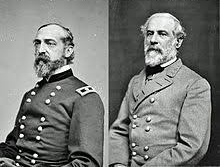Why didn’t General Meade consider abandoning the battlefield at Gettysburg? General George G. Meade did not consider abandoning the battlefield at Gettysburg for several key reasons:
Strategic Importance:
Gettysburg was a crucial location due to its network of roads, which provided access to several important cities and towns. Holding this position was vital for controlling movement in the region.
Defensive Advantage:
The Union Army held strong defensive positions on the high ground, including Cemetery Hill, Cemetery Ridge, and Little Round Top. These positions offered significant tactical advantages against the attacking Confederate forces.
Reinforcements and Resources:
The Union Army had access to reinforcements and supply lines that could support their position. Abandoning the battlefield would have meant giving up these advantages.
Morale and Commitment:
The Union Army was committed to stopping the Confederate invasion of the North. Retreating from Gettysburg would have been a severe blow to Union morale and could have emboldened the Confederates.
Communication and Orders:
Meade had just recently taken command of the Army of the Potomac and was under orders to engage and defeat General Robert E. Lee’s Army of Northern Virginia. Abandoning the field would have been contrary to these directives.
Tactical Assessments:
Throughout the battle, Meade and his corps commanders made continuous assessments of their positions and the enemy’s actions. Their evaluations indicated that holding their ground was feasible and strategically sound.
These factors combined to convince General Meade that holding the battlefield at Gettysburg was the best course of action for the Union Army.


